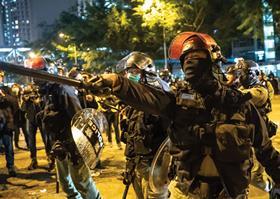In the wake of Human Rights Day on Monday, the global bar has demanded a worldwide response to serial breaches of international law by nation states.
Impunity for violations is now ’rampant’, the London-based International Bar Association said today in one of the most outspoken statements it has ever issued on human rights.
’From the victims of Russian president Vladimir Putin’s illegal invasion of Ukraine, to civilians facing grave violations in the ongoing conflict in Sudan, many are desperately seeking justice and an end to abuses,’ the IBA’s Human Rights Institute said. ’Despite this, rather than supporting the independence of international courts, a number of states are challenging the issuing of arrest warrants by the International Criminal Court – for example in relation to crimes committed in Gaza – and questioning the independence and work of the court.
’The above examples are just two of the major ongoing human rights crises that are currently taking place across the globe, highlighting the urgent need to address the escalating human rights challenges.’ it added. ’According to the Geneva Academy Rule of Law in Armed Conflicts project, currently there are 27 non-international armed conflicts, 45 international armed conflicts, and ten situations of military occupation.’

’The picture is bleak indeed,’ said Mark Stephens CBE, co-chair of the IBA’s Human Rights Institute and former president of the Commonwealth Lawyers Association. ’We are at a critical juncture where international law and the rule of law are under threat. Individual states are rolling back on commitments to human rights. Proposed constitutional reforms, such as those adopted in Mexico that will likely undermine the independence of the judiciary, call into question the commitment of states to uphold the rule of law domestically and internationally.’
Stephens added: ’Additionally, our global information ecosystem is in crisis, with unprecedented attacks against truth-tellers, journalists. The highest number in a year have been killed globally owing to the journalists killed in Gaza. In many jurisdictions publishers and dissidents are being muzzled, such as in Hong Kong, where the owner of the shuttered Apple News, Jimmy Lai, remains imprisoned as do democracy activists and human rights lawyers Margaret Ng and Martin Lee, as well as democracy activists convicted for their role in organising unofficial primary elections to choose pro-democracy legislative candidates.’
IBAHRI co-chair and immediate past-secretary general of the Swedish Bar Association, Anne Ramberg Dr Jur hc, added: ‘Undoubtedly, much needs to be done to give full life to the fundamental human rights and freedoms set out in the Universal Declaration of Human Rights [1948]. An invaluable blueprint of equality, fairness, and justice, it has paved the way for human rights treaties, instruments, and laws all over the world. Now more than ever, it is essential that they are recognised as more than just words on paper, but rather, as concrete commitments, to be translated into reality through concerted effort and action. The IBAHRI calls on governments, civil society organisations, and individuals around the world to address the urgent need for a unified global response to protect vulnerable populations and uphold human rights.’
In a separate statement, the IBA’s Hague office also reiterated its call for states to demonstrate unequivocal support for the International Criminal Court (ICC or ‘the Court’) and to protect the court and those who collaborate with it from threats and attacks.
This article is now closed for comment.



























4 Readers' comments